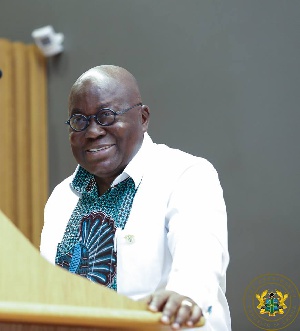The President of the Republic, Nana Addo Dankwa Akufo-Addo, says the Ghanaian people will continue to defend the right to free expression to the very end, because of their determination to build a free, open society with accountable governance.
According to President Akufo-Addo, “they have manifested, in the 4th Republic, their deep attachment to the principles of democratic accountability, respect for individual liberties and human rights, and the rule of law.”
It is this attachment, he added, “that has enabled us to continue to produce intrepid media practitioners such as Elizabeth Ohene, Tommy Thompson, Eben Quarcoo, Kabral Blay Amihere, Kofi Coomson, Kweku Baako, Kwaku Sakyi Addo, Yao Graham, Kwesi Pratt, Gina Blay, Gabby Otchere Darko, Egbert Faible Jnr, Ken Kuranchie, Anas Aremyaw Anas, Kwami Sefa Kayi, Bernard Avle, and Manasseh Azure Awuni, who have demonstrated fearless commitment to press freedom, no matter the cost.”
President Akufo-Addo made this known when he delivered a speech at the World Press Freedom Day Awards Dinner, held at the Kempinski Hotel, on Wednesday, 2nd May, 2018, on the theme "Keeping Power in Check: Media, Justice and the Rule of Law".
With the Constitution of the 4th Republic guaranteeing freedom of expression, including freedom of the press and other media, as a fundamental human right, and making elaborate provisions to protect the freedom and independence of the media, President Akufo-Addo stated that the existing laws, which were continued in force by the same Constitution, contained colonial laws on the country’s statute books that were manifestly anti-libertarian, and repressive of free expression.
“That is why, as Attorney General, under the government of the great Ghanaian statesman, His Excellency John Agyekum Kufuor, the 2nd President of the 4th Republic, I led the process, in Parliament, for the repeal of the Criminal Libel Law. The repeal, when it occurred, on 27th July, 2001, was a very happy day for me, representing one of the high points of my public career,” the President said.
He continued, “The repeal has had a very positive impact on the development of the Ghanaian media, freeing it from unnecessary self-censorship, and promoting a robust and critical media culture.”
The repeal of the law, the President indicated, has contributed to the growth of a vibrant media that has won Ghana the reputation of having one of the most media friendly and liberal climates on the continent.
“It has also contributed significantly to the deepening of democracy in our country, enhancing public accountability as a strategic goal of public policy,” he added.
The parlous justification, proffered for the retention of the Criminal Libel Law, has been that its repeal has made Ghanaian media practitioners reckless and unprofessional in their work, thereby, at times, damaging the good name and image of public figures, and endangering society as a whole.
However, President Akufo-Addo indicated that as one of the public figures most constantly vilified in sections of the Ghanaian media, and one who, ironically, was a principal actor in the repeal of the law, he continues to insist that its repeal was necessary in the public interest in our emerging democracy.
“I will say, again, that I much prefer the noisy, boisterous, sometimes scurrilous media of today, to the monotonous, praise-singing, sycophantic one of yesteryear. The Ghanaian media has, in fact, enriched the nation’s governance by its curiosity, investigative skills, and persistence,” he added.
President Akufo-Addo urged media practitioners issues before you with the same candour and passion with which you do your work on a daily basis. And as you go about your deliberations, remember that the sanctity of the future of press freedom is in your hands.
General News of Thursday, 3 May 2018
Source: Jubilee House Communications













